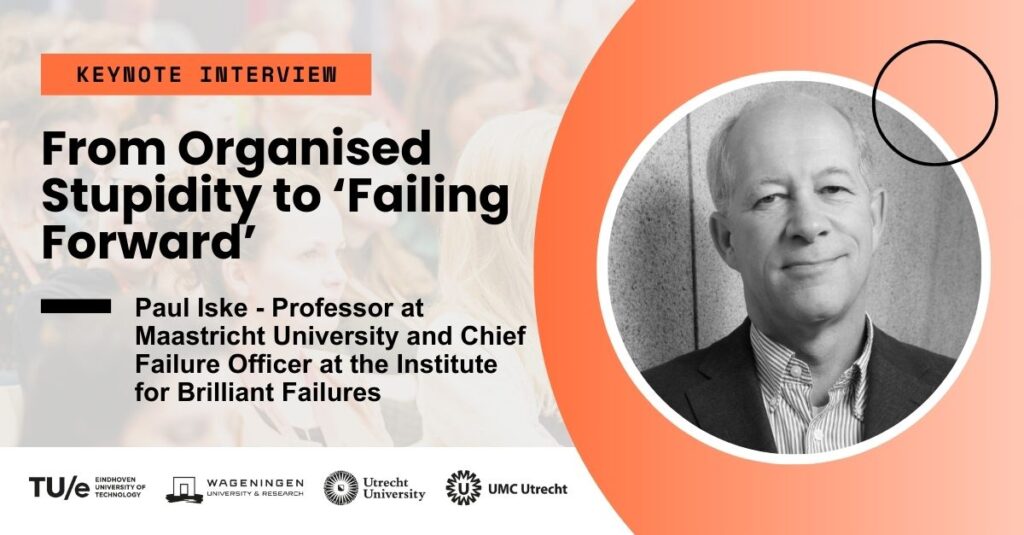By Annemieke Groenenboom
Do things that carry the risk of failure, learn from those experiences, and implement the insights gained. With this message, innovation expert Paul Iske takes the stage at the Preventive Health annual conference. “We love to share successes, including those related to preventive health, but we ignore the failures, leaving much knowledge untapped.” He advocates for greater openness about failures and the concept of ‘failing forward.’

“Preventive health is actually the only form of healthcare; the rest is sick care,” begins Paul Iske, Professor of Open Innovation & Business Venturing at Maastricht University and Chief Failure Officer at the Institute for Brilliant Failures (IfBF). “While preventive health is crucial, it also presents complexities, primarily because funding for it is often lacking. Governments, health insurers, and employers are reluctant to invest in it because they aren’t sure if they will benefit from it themselves.”
We mainly celebrate successes, neglecting the processes and failures that precede them. This leaves a wealth of valuable knowledge unutilised. I call that organised stupidity, and that’s what I want to combat,
“Despite this being a systemic issue, accountability is often directed towards individuals within the system, such as healthcare workers. However, everyone is busy and, quite understandably, tends to prioritise urgent matters over important ones. As a result, we mainly celebrate successes, neglecting the processes and failures that precede them. This leaves a wealth of valuable knowledge unutilised. I call that organised stupidity, and that’s what I want to combat,” explains Iske.
Failing Forward
According to Iske, an important step towards improvement is what he calls ‘failing forward’: “In the search for solutions in healthcare, such as new treatments, we must immediately ask ourselves how they will play out in practice. What forces and habits within the healthcare system could prevent a solution from reaching its full potential? By learning from previous processes and failures, these questions can often be anticipated and answered in advance.”
By learning from previous processes and failures, questions can often be anticipated and answered in advance.
Iske provides a striking example from curative care: “Women suffering from fibroids in their uterus often experience abdominal pain and excessive bleeding. In the worst cases, gynaecologists recommend removing the uterus, which is a major procedure. However, there is an alternative: embolisation. The interventional radiologist blocks the blood vessels feeding the fibroids, causing them to shrink due to lack of nourishment. Problem solved, without significant consequences, such as impacting the woman’s fertility.”
‘’Despite its advantages, this method remains relatively unknown and underutilised. Gynaecologists often overlook it and hesitate to refer patients to interventional radiologists for various reasons, including unfamiliarity with the technique, doubts about its suitability, or even self-interest, as only the treating physician can bill the health insurance provider. Key contributing factors include a lack of patient awareness, organised ignorance within the healthcare system, and the payer’s lack of incentive. Ideally, gynaecologists should be incentivised for making referrals, possibly through a revised financing model, and those advocating for this change need to address potential barriers to implementation in advance.’’
Stimulating Different Behaviour
This requires a new way of working. Iske encourages everyone in the healthcare system not to be afraid to try new things. “If you cling to certainties, you will certainly maintain the status quo. Learn from the process and from failures, for instance, using the 16 archetypes, such as ‘the wrong wallet,’ developed by the Institute for Brilliant Failures (ifBF) as a tool. And finally, apply those lessons in practice.”
If you cling to certainties, you will certainly maintain the status quo. Learn from the process and from failures, […] and finally, apply those lessons in practice.”
“To stimulate this behaviour, we need a robust knowledge infrastructure. Iske asserts, “not complex databases, but primarily more encounters and knowledge exchange among people in the healthcare system. I identify four key areas where this can be facilitated: First, it’s essential to foster a culture where individuals are willing to learn from one another; for example, by sharing failures during the conference. Second, organisational capacity is crucial for establishing agreements. Conduct an inventory of who possesses what knowledge and agree on how to share it. Also, consider arrangements with funders: ZonMw could, for instance, incorporate ‘failing forward’ into their conditions. The third aspect is infrastructure; think of (digital) technologies that can aid in disseminating this knowledge, such as BriMis, the database of failed projects from the IfBF. Lastly, we must create spaces where we can physically meet and apply what we’ve learned. I hope we can initiate this journey during the conference.’’